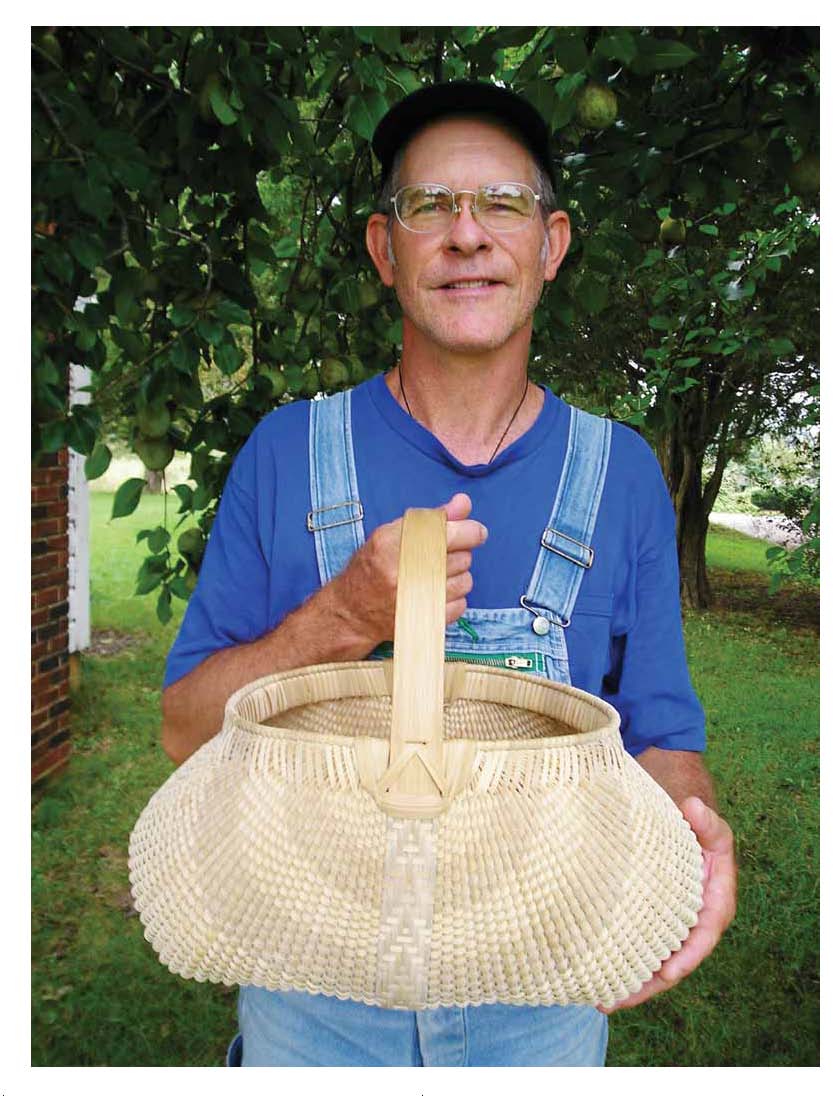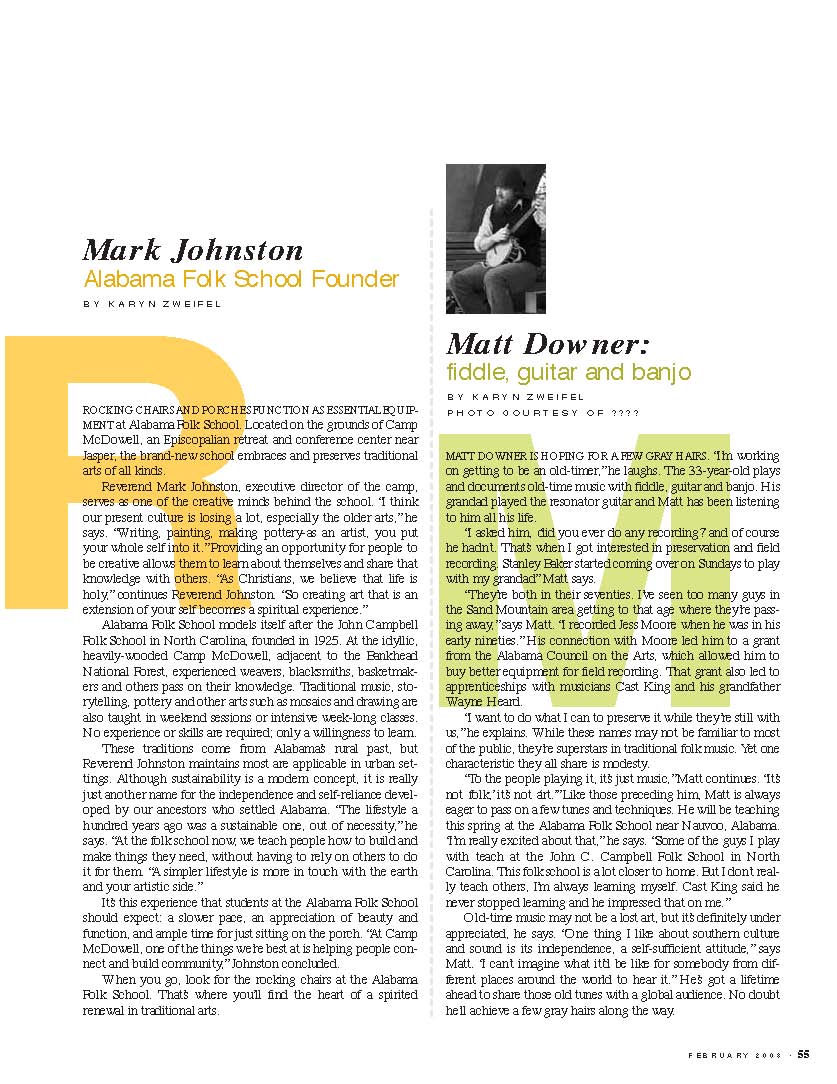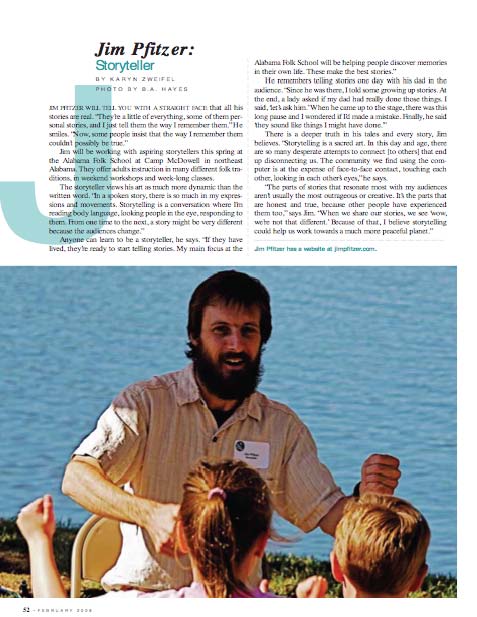



Portico Magazine
Lost Arts
Storyteller Jim Pfitzer
December 7, 2007
Draft 1
Jim Pfitzer will tell you with a straight face that all his stories are real. "They're a little of everything, some of them personal stories, and I just tell them the way I remember them." He smiles. "Now, some people insist that the way I remember them couldn't possibly be true."
Pfitzer will be working with aspiring storytellers this spring at the Alabama Folk School at Camp McDowell in northeast Alabama. They offer adults instruction in many different folk traditions, in weekend workshops and week-long classes.
The storyteller views his art as much more dynamic than the written word. "In a spoken story, there is so much in my expressions and movements. Storytelling is a conversation where I'm reading body language, looking people in the eye, responding to them. From one time to the next, a story might be very different because the audiences change."
Anyone can learn to be a storyteller, he says. "If they have lived, they're ready to start telling stories. My main focus at the Alabama Folk School will be helping people discover memories in their own life. These make the best stories."
He remembers telling stories one day with his dad in the audience. "Since he was there, I told some growing up stories. At the end, a lady asked if my dad had really done those things. I said, 'let's ask him.' When he came up to the stage, there was this long pause and I wondered if I'd made a mistake. Finally, he said 'they sound like things I might have done.'"
There is a deeper truth in his tales and every story, Pfitzer believes. "Storytelling is a sacred art. In this day and age, there are so many desperate attempts to connect that end up disconnecting us. The community we find using the computer is at the expense of face-to-face contact, touching each other, looking in each other's eyes.
"The parts of stories that resonate most with my audiences aren't usually the most outrageous or creative. It's the parts that are honest and true, because other people have experienced them too. When we share our stories, we see 'wow, we're not that different.' Because of that, I believe storytelling could help us work towards a much more peaceful planet."
Jim Pfitzer has a website at jimpfitzer.com.
Portico Magazine
Matt Downer: fiddle, guitar and banjo
Lost Arts
December 10, 2007
Draft 1
Matt Downer is hoping for a few gray hairs. "I'm working on getting to be an old-timer," he laughs. The 33-year-old plays and documents old-time music with fiddle, guitar and banjo. His grandad played the resonator guitar and Downer has been listening to him all his life.
"I asked him, 'did you ever do any recording?' and of course he hadn't. That's when I got interested in preservation and field recording. Stanley Baker started coming over on Sundays to play with my grandad.
"They're both in their seventies. I've seen too many guys in the Sand Mountain area getting to that age where they're passing away. I recorded Jess Moore when he was in his early nineties." His connection with Moore led him to a grant from the Alabama Council on the Arts, which allowed him to buy better equipment for field recording. That grant also led to apprenticeships with musicians Cast King and his grandfather Wayne Heard.
"I want to do what I can to preserve it while they're still with us," he explains. While these names may not be familiar to most of the public, they're superstars in traditional folk music. Yet one characteristic they all share is modesty.
"To the people playing it, it's just music," Downer continues. "It's not 'folk,' it's not 'art.'" Like those preceding him, Downer is always eager to pass on a few tunes and techniques. He will be teaching this spring at the Alabama Folk School near Nauvoo, Alabama. "I'm really excited about that," he says. "Some of the guys I play with teach at the John C. Campbell Folk School in North Carolina. This folk school is a lot closer to home. But I don't really teach others, I'm always learning myself. Cast King said he never stopped learning and he impressed that on me."
Old-time music may not be a lost art, but it's definitely under appreciated, he says. "One thing I like about southern culture and sound is its independence, a self-sufficient attitude. I can't imagine what it'd be like for somebody from different places around the world to hear it." He's got a lifetime ahead to share those old tunes with a global audience. No doubt he'll achieve a few gray hairs along the way.
Portico Magazine
Nancy Lea
Lost Arts
December 10, 2007
Draft 1
"In the south, we do love our traditions," says weaver Nancy Lea. "When we feel like we're losing them we want to grab them and get them back. But I've lived in other places where they loved their arts just as much."
Lea practices an ancient craft, but came to it with a very modern approach. "I get a chuckle every time somebody asks me if I learned to weave from my grandmother. I studied textile design at Calvin Klein's alma mater, the Fashion Institute of Technology."
In some ways, she sees weaving as a lost art. "as far as being an everyday activity, it is," she says. But the practice is not completely abandoned. "A few independent weavers have studios around the country. For me, the folk arts are not separate from everyday living. When I'm weaving, I feel a very strong tie. There's just something very comfortable about practicing traditional arts."
A neighbor taught Lea to weave, and others encouraged her as she worked in textile restoration and tapestry weaving. "I really fell in love with weaving and feel very evangelical about it. I teach children at a local arts center every summer." Lea will be introducing adults to weaving at the Alabama Folk School this spring. "Camp McDowell is such a beautiful setting, and the Folk School was a brilliant idea."
Lea returned to her home town, Selma, Alabama, after an absence of nearly 40 years. "I had been homesick for years, and I was always trying to devise a way to come back." Finding work in her field is difficult, and most work is found in urban areas. "I am blessed in that I have the means to set up a studio here. With my weaving I make enough to pay for yarn and equipment." Her work is on display at Black Belt Treasures in Camden. "This has always been home for me. I live two blocks away from my old elementary school and I love it."
Sidebar: The Alabama Folk School is located outside Nauvoo, Alabama, 16 miles northwest of Jasper. Five day and weekend classes are available. The website has more information and class schedules(http://www.campmcdowell.com/FolkSchool/index.htm). You may also call the school's director, Megan Huston, at 205-387-1806, or email folkschool@campmcdowell.com.